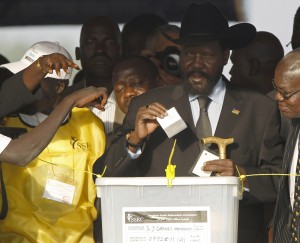Carter Center: S. Sudan election law should have term limits for president, governors
March 19, 2012 (JUBA) – The US-based Carter Center has advised South Sudan lawmakers to ensure that term limits, particularly for the president and state governors are included within the country’s national elections law, currently in its final review stage within the national assembly.

South Sudan’s National Legislative Assembly (NLA) recently conducted a series of public hearings on the national elections bill; a law seeking to establish the framework for political competition in future elections in South Sudan. The law is widely seen as a bench mark to steer progress in by-elections for vacant legislative seats at the state and national level.
To achieve this the organisation, which was founded by former US President Jimmy Carter, urges all stakeholders, particularly the citizens, civil society and political parties to support lawmakers in debating the draft bill, which strives to lay the ground work for credible future elections in South Sudan as per international standards and best practices.
The Carter Center, also advocates for the appointment of an independent National Elections Commission (NEC), which it says remains critical in efforts to ensure that elections are conducted in a transparent and credible atmosphere, meet international standards, and elect governments that represent the will of the people.
The current draft bill stipulates that the NEC will consist of nine members appointed by the president and approved by a two-thirds parliamentary majority, consideration. The Carter Center statement said that further measures could be taken to strengthen elements of the act to ensure the neutrality and impartiality of this important body.
County commissioners in South Sudan are not elected but appointed by the state governor under the present system. The Carter Centre said that the
“Current language on the appointment of commissioners is vague and only notes that the president consider consultation with and representation of civil society and women’s groups, without mentioning how this will occur”.
“The NLA could consider an alternative system for appointing commissioners such as maintaining some seats on the NEC as presidential appointments, while reserving a number of seats to be chosen by leaders of minority parties in the assembly,” it adds.
Meanwhile, the Carter Center also argues that the national election law should clearly define the right of participation in elections for South Sudanese in the Diaspora. Stakeholders, it says, could also contemplate clarifying a provision allowing South Sudanese living abroad to participate in elections by casting ballots at embassies or through other means, in support of the human right of universal and equal suffrage.
The draft law in its current form reportedly only briefly states that the NEC will prepare the electoral register and list of candidates across South Sudan and abroad, while reportedly ignoring eligibility requirements for those living abroad.
“While the elections law need not be overly detailed regarding the specifics of these requirements, the addition of some language on the out-of-country voting process would ensure its incorporation within the NEC’s mandate,” it further stated.
The Carter Center, on the other hand, lauded the recent public hearings hosted by the NLA committee on legislation and justice on the draft elections bill, saying it indicates the assembly’s eagerness to consult with citizens, civil society, and political parties.
The public hearings, it added, reflects positively on the Government of South Sudan’s commitment to uphold the right of access to information and freedom of expression, as required by the Transitional Constitution.
(ST)
